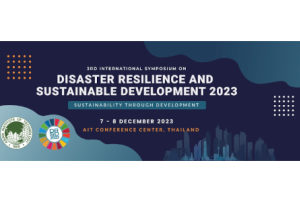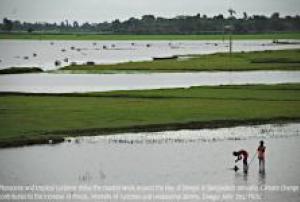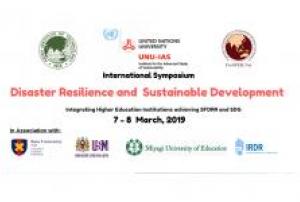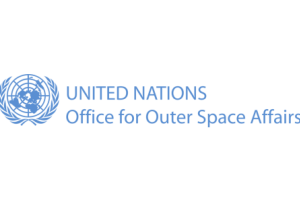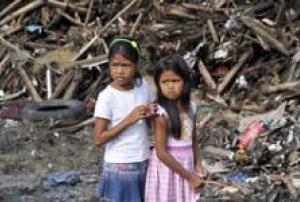Thailand
country taxonomy block
Contact Person
Anucha Mokkhavesa
Tel : +66 2367 3669
Email: foreign_dpm [at] yahoo.com
Address:
3/12, U-Thong Nok Road, Dusit District
Bangkok, 10300
Thailand
Mr Chaowalit Silapathong
Tel: + 662 141 4400, +662 141 46
Email: chaow [at] gistda.or.th
Address:
The Government Complex, 7th Floor, 120 Moo 3 Chaeng Wattana Rd. Laksi
Bangkok, 10210
Thailand
The evolution of disaster risk has become more complex due to the effects of climate change, advancements in technology and infrastructure, and growing anthropogenic pressures. The impending risks have wide-ranging and long-term implications for societal sustainable development. Under current development pathways, the world should prepare to face the possibility of more compounding hazards and complex risk landscapes in the future brought on by biological, technological, natural, and man-made hazards, of which many are interrelated and self-perpetuating. Devising adaptation and mitigation measures require deeper expositions and investigation of risk drivers in order to achieve sustainable development goals.
The “3rd International Symposium on Disaster Resilience and Sustainable Development”, referred to as DRSD 2023, organized by the Asian Institute of Technology, gathers experts, practitioners, policymakers, and students from Asia Pacific and beyond to present a discourse…
moreCOURSE OVERVIEW
The rapid population growth and urbanization combined with extreme climatic events are causing a swift increase in vulnerability of communities to hazardous events. Unplanned growth both in urban and non-urban areas calls for preparation to reduce the impact of disasters, and there is a great need to utilize disaster risk information in designing effective coping mechanisms.
Disaster risk information is spatial in nature and geographic information systems (GIS) play an important role in disaster risk assessment and management. There is a need to create awareness among disaster management professionals regarding the importance of utilizing GIS.
The curriculum for this course has been re-designed jointly by ADPC, Asian Institute of Technology, the Faculty of Geo-Information Science and Earth Observation of the University of Twente, Netherlands, and the United Nations Institute for Training and Research's Operational Satellite Applications Programme (…
more
At this conference, industry leaders and technology experts will share their views on how geospatial technology, including LIDAR and satellite imagery enhances operational flood prediction and post-event flood monitoring as well as to share experiences and best practices on the most up-to-date geospatial technologies to assess the accuracy of current ground elevation data for hydrologic and hydraulic modeling for flooding areas. In addition, ample time has been set aside to share latest update and technology innovation in terrestrial mapping solutions and leveraging the value of digital earth observation for earthquake disaster management and recovery.
The Asian Disaster Preparedness Center (ADPC) will be conducting a training course entitled Disaster Risk Communication. The training course is based on the need to address the role of communication in disaster risk management. The training course will be held in Bangkok, Thailand, from 20 to 22 March 2017.
The course will cover the following topics:
• Communication Needs in the Different Phases of the Disaster Risk Management (DRM) Cycle
• Risk Communication Theories
• Understanding Audiences
• Making Messages Work
• Options for Taking the Message Across
• Designing and Implementing an Effective Communication Plan Including M & E
• Role of Mass Media in Disaster Risk: Effectively Engaging the Media
There will be discussions and scenario-based groups during the course.
The course fee of US$ 1,375.00 covers hotel accommodation, complimentary buffet breakfast, morning and after…
moreCourse purpose
The course offers to build the capacity of professionals to design, manage, evaluate and undertake improvements in people centered end-to-end early warning systems for hydro-meteorological & geological hazards and extreme events associated with climate change and variability. it builds upon ADPC's two decades of experiences in disaster management, facilitating regional cooperation and building capacities of disaster management institutions at all government levels, disaster management practitioners and communities. it extends to a decade of experience in institutionalizing weather and climate information applications for disaster mitigation and recently, in the implementation of Indian Ocean and South East Asia end-to-end early warning system for tsunami and hydro-meteorological hazards. Upon completing the course, participants will be able to:
- understand operational mechanisms and procedures for the prediction,…
From 22 to 26 July 2019, the training course on Integrated Flood Risk Management (IRFM) will introduce practitioners to the key concepts of IRFM. The course is organized by and held at the Asian Disaster Preparedness Center (ADPC).
Flood risk management has traditionally been focused on evacuating floodwater as soon as possible or on storing it temporarily through structural measures such as dams or levees. However, traditional flood mitigation is not always desirable or feasible. As a result, Integrated Flood Risk Management (IFRM) is gaining traction among flood risk and water management professionals. IFRM is a more integrated and comprehensive approach taking a catchment or basin perspective that includes nature-based solutions. It also rests on the principle that water management and land-use planning should combine both structural and non-structural measures to manage water and achieve flood mitigation.
The training will cover the following…
moreThe International Symposium on Disaster Resilience and Sustainable Development, taking place on 7 and 8 March, 2019 in Bangkok, aims at reinforcing the integration between the Natural- and the Social Science approach concerning the Sustainable Development Goals (SDG) and the Sendai Framework for Disaster Risk Reduction (SFDRR).
The Symposium is one of the initiatives of ProSPER.Net project “Disaster Resilience and Sustainable Development Education Network in Asia” lead by Asian Institute of Technology, Thailand along with the partner universities in the Asia Pacific Region.
During the two days of the programme, participants will engage in panel discussions, keynote speeches, technical sessions and academic exhibitions. The symposium will facilitate the exchange of knowledge between the participating researchers, practicioners and policy makers concerned with DRR, resilience and sustainable development. Moreover, the programme focuses on…
moreDisasters affect individuals differently based on gender, age, and disabilities. Therefore, the Asian Disaster Preparedness Center (ADPC) invites those interested in advancing their understanding and capabilities in Gender Equality and Social Inclusion (GESI) in Disaster Risk Reduction (DRR) to join the upcoming 5th Training Course on Gender Equality and Social Inclusion in Disaster Risk Reduction. The course will take place from May 14th to May 16th, 2024, in Bangkok, Thailand.
In the long run, the course aims to promote gender and socially responsive on-ground resilience to climate change and disasters. It also aims to strengthen the technical and advocacy capacities of the participants in gender and social inclusion.
Disaster risk within a country has its roots in development decisions that do not adequately address disaster concerns, and the resulting disasters are coming at the cost of development and poverty reduction. By not considering disaster risk in development planning, new risks could be unintentionally created or existing ones exacerbated through investments in infrastructure and public services, and through improper planning and regulation.
COURSE CONTENT
Module 1: Introduction to disaster risk reduction
The first module will provide participants with the basic knowledge on disaster risk reduction (DRR) that is required to support a detailed understanding of mainstreaming. The module will cover terminologies related to DRR, discuss the comprehensive link between disasters and development, and provide a basic outline on risk assessment and how to use risk information to guide development decisions.
Module 2: Mainstreaming disaster risk…
moreThe fundamental principle of community-based disaster risk reduction (CBDRR) involves the development of bottom-up processes arising from the communities themselves. Development is based on the community's specific needs and its aspirations for safety, and appropriate actions to address these. In above context, ADPC realizes CBDRR is a significant principle to reduce the disaster risk. Therefore, ADPC is pleased to announce the 24th Regional Training Course on Community-Based Disaster Risk Reduction to be held from July 20-31, 2015 in Bangkok, Thailand.
Course Objective:
View Workshop Agenda
Presentations
Wednesday 7th December 2022
|
Time |
Session title Presentations titles |
Moderator Speakers |
|---|---|---|
|
09:15- 09:45 |
Opening Session |
Why the course?
Initiated in 2003, ADPC has conducted nine (9) successful EVRC courses providing training on earthquake vulnerability reduction strategies, know-how for the development of organized approaches for earthquake vulnerability reduction, knowledge and skills for implementation of mitigation initiatives, appreciation of risk communication, analysis of the need to develop multi-sectoral partnerships for successful implementation of mitigation measures.
Who can attend?
This course is particularly useful for those concerned with earthquake vulnerability reduction upon the development context. It is open to all countries. Participation by decision makers, elected and appointed national and local administrators, development and planning authorities, as well as officials in urban planning, housing, public works, and related sectors. is especially encouraged. The course is of certain benefits to…
moreAt the commencement of Year 2015, Asian Disaster Preparedness Center would like to offer the opportunity for those who want to enhance their knowledge and skills in disaster risk management to attend the 6th Regional Training Course on Mainstreaming Disaster Risk Reduction into National Development Process.
You can participate to the new training course on Mainstreaming Disaster Risk Reduction into National Development Process to be held from 18 - 22 May 2015 in Bangkok, Thailand.
The goal of the course is to enhance understanding on mainstreaming Disaster Risk Reduction (DRR) in the development planning process, in order to build the capacities of government officials, development partners and stakeholders to implement disaster resilient development. The specific objectives of the course include:
-to increase awareness among participants on the need to mainstream DRR into the development planning processes
-to enhance the capacity of participants on '…
moreRapid population and urbanization, combined with extreme climatic events, are causing a swift increase in the vulnerability of communities to hazardous events. Unplanned growth in both urban and non-urban areas calls for preparation to reduce the impact of disasters. There is also a great need to utilize disaster risk information to design effective coping mechanisms.
This ten-day course not only explains what spatial data is and how it is collected, but also teaches how to use data during pre- and post-disaster management, including in early warning systems and hazard-, vulnerability-, risk-, and damage assessments, and in the design of risk reduction measures.
A course fee will be charged. Find the application form here.
